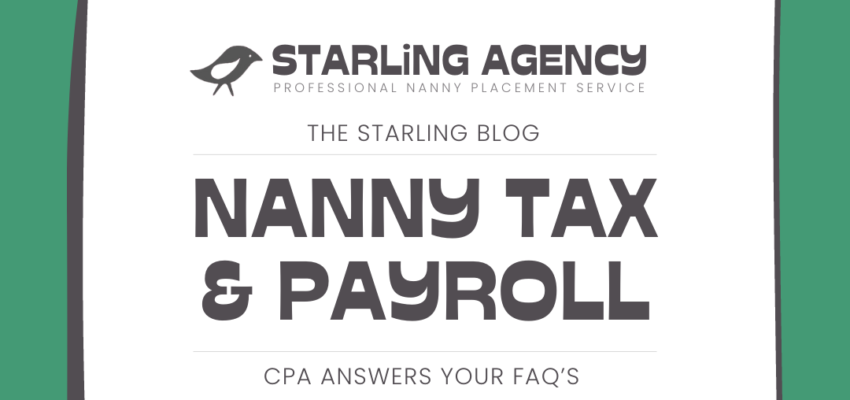
Nanny Tax & Payroll FAQ
CPA Answers FAQ
We love to share expert information from the best in the field! One of the more common inquiries is about Seattle nanny tax and payroll. We reached out to a local nanny payroll and tax CPA, to help answer some FAQ’s.
How do I know if I am a household employer? Can I treat my nanny as an independent contractor?
You are a household employer if you have a domestic employee working in your home, under your direction. Your nanny is not an independent contractor.
Am I required to pay employment taxes? How much do nanny taxes cost the employer?
As a household employer, you are responsible for withholding and depositing your employee’s share of payroll taxes (Social Security and Medicare), as well as federal income taxes if your employee wants such taxes withheld. You are also responsible for paying the employer’s share of payroll taxes, plus federal and state unemployment taxes. The employer’s share of taxes is equal to approximately 10% of your nanny’s gross wages.
Do I have to pay my nanny overtime? Can I pay them as a salaried employee?
Household employees are deemed non-exempt employees, which means they are entitled to minimum wage and overtime pay. Overtime is considered to be more than 40 hours in a 7-day period.
I’m part of a nanny share. Does each family need to pay at least minimum wage as their share of the nanny’s hourly rate?
In a nanny share, each family is considered a separate employer, even if the care is provided in only one of the homes. As such, each family must obtain its own federal and state tax ids; each family tracks the nanny’s hours, wages and taxes separately; each family pays the nanny separately for the hours they worked for that family; and each family withholds and deposits taxes with the IRS and the state of Washington related to the wages that the nanny earned from that family. At year-end, each family provides a W2 to the nanny. As one of many benefits to being in a nanny share, the families can individually pay less than minimum wage as long as the combined hourly rate paid to the nanny is at least minimum wage.
How do I report household employment taxes to the IRS? Are they deductible?
You report your household employment taxes on Schedule H of your personal income tax return. You also report the amount of estimated tax deposits you’ve made throughout the year. These amounts should be approximately the same, so that you don’t have a net nanny tax liability when you file your return.
While household employment taxes are not deductible on your personal income tax return, you may be able to benefit from either a dependent care account (FSA) offered by your employer, or the Child Care Tax Credit.
What are the benefits of using a household employment tax expert vs. trying the DIY approach?
Household employment taxes and payroll administration can be tricky and time-consuming. Using a household employment tax expert ensures that your nanny’s wages are calculated correctly; that the employee and employer share of federal and state taxes are calculated and tracked correctly; that quarterly and annual state and federal wage reporting deadlines are met; and that all taxes are paid timely. In sum, using an expert gives you peace of mind and time back in your busy schedule.
More from Starling…
Starling is a stellar nanny placement agency proudly serving Greater Seattle and the Eastside. Starling nannies are passionate about education and child development! We represent professional nannies, private teachers, newborn care specialists, household managers, family assistants, personal assistants, and more. Learn more about Starling’s core values.
